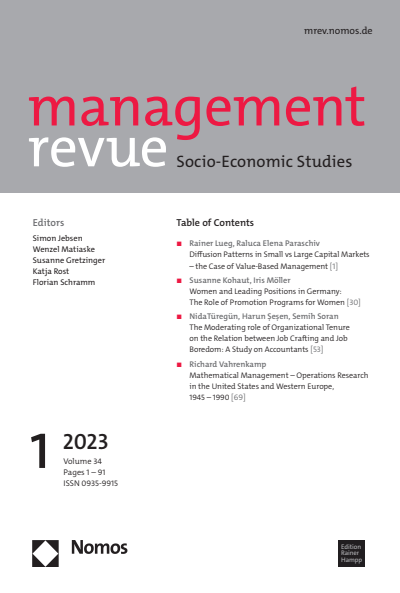The Relationships Between Work-Related Rumination, Employee Voice and Silence, Turnover Intention, and Job Satisfaction
IF 1.7
0 MANAGEMENT
引用次数: 1
Abstract
How employees think about their work after the end of their working day has received renewed emphasis recently. Work-related rumination could affect employees' voice behaviour. Some employees could prefer to speak up about ideas or concerns that bother them on an ongoing basis, and other employees can choose instead to remain silent. This could further impact specific organisational outcomes, such as employees' satisfaction in their job and their intention to leave the organisation. The objective of this study was to investigate the relationships between work-related rumination, employee voice and silence, turnover intention, and job satisfaction. A cross-sectional research design was used to collect data from a general sample of employees (n = 332). Structural equation modelling methods were used for data analysis. The results showed the proposed direct relationships between the research constructs, except between affective rumination and employee voice, and also employee voice and job satisfaction. Indirect relationships also showed how employee voice and silence played mediating roles in the relationships between work-related rumination and turnover intention. Organisations should be aware of the dynamics between work-related rumination and employee voice and silence behaviour within their organisation as this affects outcomes.工作反刍、员工声音与沉默、离职倾向与工作满意度的关系
最近,员工下班后如何看待自己的工作再次受到重视。与工作相关的沉思可能会影响员工的建言行为。有些员工可能更愿意说出一直困扰他们的想法或担忧,而其他员工则可以选择保持沉默。这可能会进一步影响具体的组织结果,例如员工对工作的满意度和他们离开组织的意愿。本研究旨在探讨工作反刍、员工声音与沉默、离职倾向与工作满意度之间的关系。采用横断面研究设计从一般员工样本中收集数据(n = 332)。采用结构方程建模方法进行数据分析。结果表明,除了情感反刍与员工声音、员工声音与工作满意度之间存在直接关系外,研究构念之间也存在直接关系。间接关系还显示了员工声音和沉默在工作反刍与离职倾向的关系中起中介作用。组织应该意识到与工作相关的反思与员工声音和沉默行为之间的动态关系,因为这会影响结果。
本文章由计算机程序翻译,如有差异,请以英文原文为准。
求助全文
约1分钟内获得全文
求助全文
来源期刊

Management Revue
MANAGEMENT-
CiteScore
1.20
自引率
0.00%
发文量
7
期刊介绍:
Management Revue - Socio-Economic Studies is an interdisciplinary European journal that undergoes peer review. It publishes qualitative and quantitative work, along with purely theoretical papers, contributing to the study of management, organization, and industrial relations. The journal welcomes contributions from various disciplines, including business and public administration, organizational behavior, economics, sociology, and psychology. Regular features include reviews of books relevant to management and organization studies.
Special issues provide a unique perspective on specific research fields. Organized by selected guest editors, each special issue includes at least two overview articles from leaders in the field, along with at least three new empirical papers and up to ten book reviews related to the topic.
The journal aims to offer in-depth insights into selected research topics, presenting potentially controversial perspectives, new theoretical insights, valuable empirical analysis, and brief reviews of key publications. Its objective is to establish Management Revue - Socio-Economic Studies as a top-quality symposium journal for the international academic community.
 求助内容:
求助内容: 应助结果提醒方式:
应助结果提醒方式:


